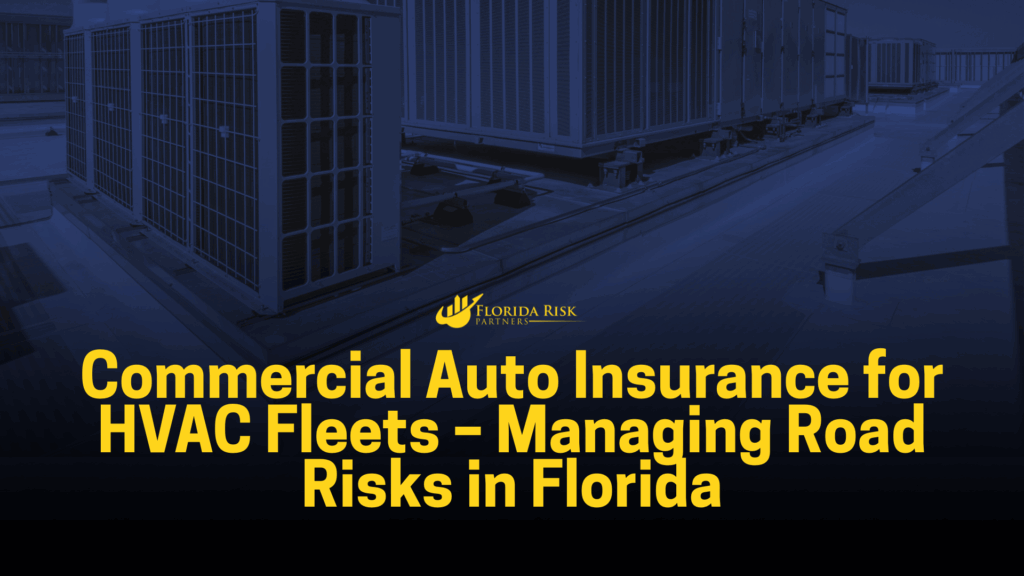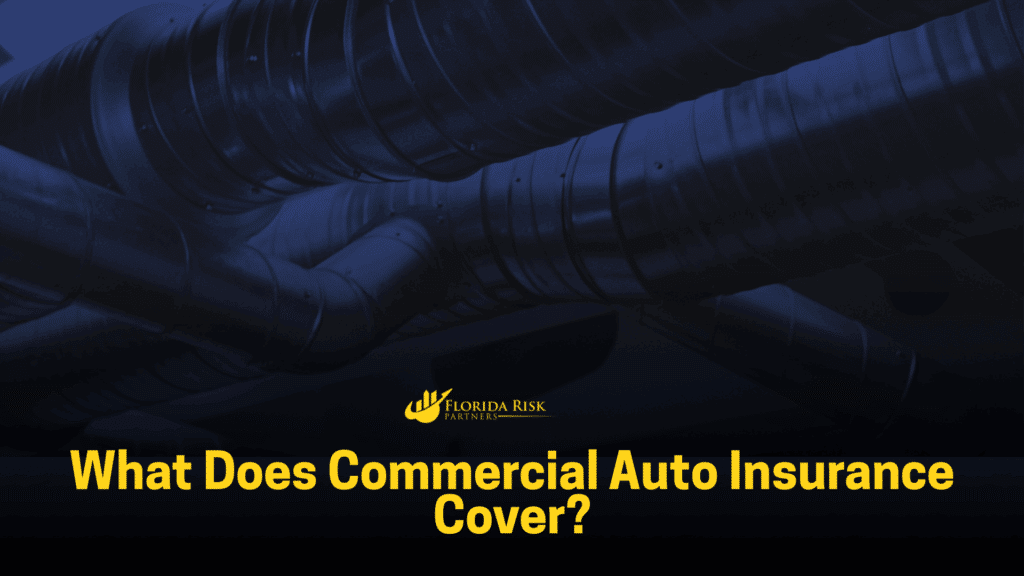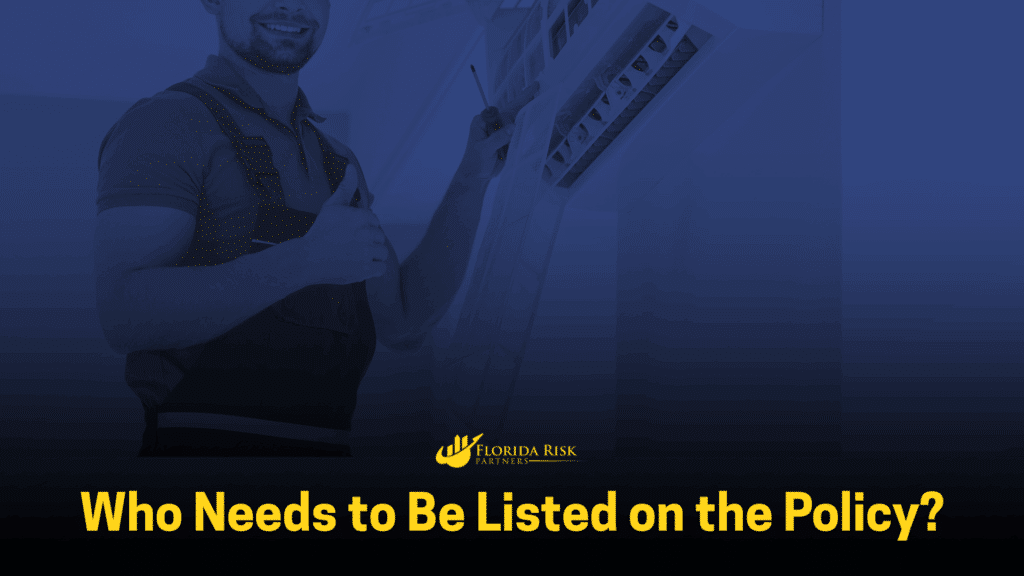-
Main Office: 1434 E. Bloomingdale Ave Valrico, FL 33596-6110
-
Phone: (888) 601-6660
-
Email: info@floridariskpartners.com

If you own or manage an HVAC business in Florida, there’s a good chance your vehicles are the backbone of your daily operations. Your trucks and vans haul equipment, transport technicians, and serve as mobile advertisements for your brand. But they also come with serious exposure to accidents, injuries, and property damage—especially on Florida’s congested and storm-prone roads.
That’s where commercial auto insurance comes in. This critical coverage helps HVAC contractors manage risks that arise any time a company vehicle hits the road. And in the high-liability legal environment of Florida, having the right coverage isn’t just smart—it’s a must.
In this post, we’ll break down what commercial auto insurance covers, why HVAC companies in Florida need it, what common claim scenarios look like, and how to make sure your policy is road-ready.
Why Florida HVAC Contractors Need Commercial Auto Insurance
Whether you’re running one truck or a full fleet, your business faces unique risks behind the wheel. Here’s why commercial auto insurance is an essential piece of any Florida HVAC company’s risk management strategy:
1. Personal Auto Policies Won’t Cover Business Use
Many contractors make the mistake of assuming their personal auto insurance will cover them during a service call. It won’t. If your vehicle is used for business purposes—even part-time—personal insurance may deny a claim. That could leave you holding the bag for tens of thousands in vehicle damage, liability, or injury-related expenses.
2. Florida Roads Are Risky
From Miami traffic to pop-up thunderstorms in Tampa, driving conditions in Florida can change in an instant. Add distracted drivers, uninsured motorists, and year-round tourism, and the risk of accidents skyrockets. Without commercial auto coverage, a single fender bender could grind your business to a halt.
3. Your Vans Carry Expensive Equipment
HVAC vans aren’t just for transportation—they’re mobile toolboxes. If you’re in an accident, those tools can be damaged or stolen. Some commercial auto policies include equipment coverage endorsements, or you may need to combine coverage with inland marine insurance to protect your gear in transit.
What Does Commercial Auto Insurance Cover?
Commercial auto policies are highly customizable based on the vehicles in your fleet and how you use them. Here are the standard coverages Florida HVAC businesses typically include:
Liability Coverage
- Covers bodily injury or property damage you cause to others while driving a company vehicle.
- Legally required in Florida.
Example: One of your technicians rear-ends a car while driving to a job in Orlando. The driver files a claim for medical expenses and vehicle repairs. Your commercial auto policy covers the cost.

Physical Damage Coverage (Collision and Comprehensive)
- Collision: Covers damage to your vehicle in an accident.
- Comprehensive: Covers damage from non-collision events like theft, fire, flooding, or falling objects.
Example: A hurricane causes a tree to fall on your parked work truck. Your comprehensive coverage helps pay for the damage.
Uninsured/Underinsured Motorist Coverage
- Covers you if someone hits your company vehicle and they don’t have enough (or any) insurance.
Florida has one of the highest rates of uninsured drivers in the country—so this is especially important.
Medical Payments or Personal Injury Protection (PIP)
- Pays for medical treatment for the driver and passengers of your vehicle, regardless of fault.
Hired and Non-Owned Auto Coverage (HNOA)
- Covers liability when employees drive their personal vehicles or rented vehicles for business.
Example: Your office manager drives their personal car to pick up a part at the supply house and causes an accident. HNOA coverage steps in.
Real-World HVAC Commercial Auto Claim Scenarios in Florida
Let’s look at some actual claims to show how this coverage can save your business from disaster:
Claim 1: Rear-End Collision in Fort Lauderdale
A technician driving a company van during rush hour failed to stop in time and rear-ended another vehicle. The driver of the other car filed a claim for neck injuries and missed wages. The HVAC company’s liability insurance paid $65,000 in damages and legal defense costs.
Claim 2: Van Break-In in Jacksonville
While parked overnight at a hotel, a contractor’s van was broken into. Over $15,000 worth of tools and copper tubing were stolen. The physical damage portion of the auto policy didn’t cover the tools—but inland marine insurance did. This is why policy coordination matters.
Claim 3: Hydroplaning Incident in Sarasota
During a heavy afternoon downpour, a service van hydroplaned, slid off the road, and was totaled. Fortunately, no one was hurt, and the company’s comprehensive coverage paid for the full vehicle replacement, getting the tech back on the road within days.
Choosing the Right Vehicles and Class Codes
Insurance premiums are based in part on the vehicle type, use, and class code. For example:
- A Ford Transit with shelving and HVAC logos will be rated differently than a pickup truck towing a trailer.
- Vehicles driven daily to job sites have a higher risk profile than vehicles used occasionally.
Make sure all vehicles are accurately listed on your commercial auto policy with correct VINs, usage details, and driver assignments. Misclassifying a vehicle could lead to denied claims.
Who Needs to Be Listed on the Policy?

Anyone who drives your vehicles—full-time or part-time—should be listed as an approved driver. This includes:
- HVAC technicians
- Apprentices or trainees
- Office staff who pick up parts
- Temporary or seasonal workers
Drivers are rated based on age, driving history, and license class. Failure to disclose drivers can result in denied claims or premium penalties.
Tips for Managing Fleet Risk and Keeping Premiums Low
Managing risk on the road is just as important as having the right insurance. Here are some best practices for HVAC business owners in Florida:
1. Implement a Driver Safety Program
- Conduct motor vehicle record (MVR) checks during hiring.
- Require defensive driving training.
- Enforce seatbelt and cellphone policies.
- Monitor driving behavior with GPS/telematics systems.
2. Secure Your Vehicles and Tools
- Park in secure, well-lit areas overnight.
- Use lockable storage systems for tools.
- Consider alarm systems or GPS tracking for high-value vehicles.
3. Perform Regular Maintenance
- Keep a fleet maintenance log.
- Inspect brakes, tires, lights, and fluid levels weekly.
- Address mechanical issues promptly.
4. Update Your Insurance When Changes Happen
- Add or remove vehicles promptly.
- Notify your agent when hiring new drivers.
- Review your policy annually as your business grows.
What Does Commercial Auto Insurance Cost for HVAC Contractors in Florida?
Premiums depend on several factors:
- Number of vehicles
- Vehicle types and value
- Driving history of employees
- ZIP code where vehicles are garaged
- Annual mileage
- Coverage limits and deductibles
On average, HVAC contractors in Florida may pay $1,200–$2,500 per vehicle per year, depending on coverage and risk factors. Telematics programs can sometimes offer discounts for safe driving behavior.
Final Thoughts: Protect Your Fleet, Protect Your Business
Your HVAC business doesn’t move without your vehicles. Whether it’s a single service van or a 10-truck fleet, having the right commercial auto insurance ensures that a single accident, theft, or storm won’t grind your operations to a halt.
In Florida, where road risks are high and legal judgments can be severe, protecting your fleet is not just a safety measure—it’s a growth strategy. Clients and general contractors expect you to carry proper insurance, and having it in place positions your company as professional, prepared, and trustworthy.
Want a Second Opinion on Your Fleet Coverage?
If you’re not sure whether your commercial auto policy covers everything your HVAC business needs, let’s talk. We’ll review your vehicles, drivers, and routes—and help you build a smarter, more protective policy.
Call Us Or
Schedule an Appointment
Select an agent below to view our online calendars and select a day and time that works best for you or call us directly at 888-601-6660. When you use our online calendars, you will receive an email with more information.



